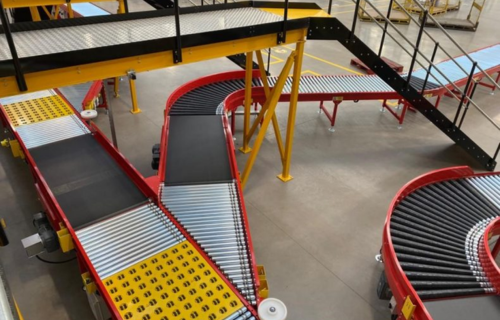Conveyor systems have transformed material handling in modern industries. In today’s dynamic landscape, businesses strive for operational efficiency and excellence. This has led to the adoption of conveyor systems, revolutionizing material handling processes across various sectors.
By automating the movement of goods and materials, conveyors offer a plethora of benefits that streamline operations, improve productivity, and reduce costs. In this blog post, we will delve into the technical and professional advantages of installing conveyors, exploring the specific benefits they provide in different industries.
I. Increased Efficiency and Material Handling Optimization:
- Automated Material Transportation: Conveyors eliminate the need for manual handling of goods, thereby reducing the risk of errors, damages, and workplace injuries. Through the automation of material movement, conveyors ensure consistent and efficient transportation throughout the production or distribution process.
- Continuous Flow and Seamless Integration: Conveyors enable a seamless and continuous flow of materials, eliminating delays and bottlenecks in production lines. They can be seamlessly integrated into existing workflows, promoting smooth material flow and enhancing overall operational efficiency.
- Sorting and Diverting Capabilities: Advanced conveyor systems incorporate sorting and diverting mechanisms, facilitating the routing of materials to specific destinations. This capability optimizes the material handling process, minimizing the need for manual intervention and increasing overall efficiency.
II. Improved Productivity and Throughput:
- High-Speed and High-Volume Handling: Conveyors are designed to handle large volumes of materials quickly and efficiently. With their high-speed capabilities, conveyors enable faster transportation, leading to increased productivity and throughput.
- Synchronization and Coordination: Conveyor systems can be synchronized with other equipment such as packaging machines or robotic arms, allowing for seamless coordination of tasks. This synchronization minimizes idle time and maximizes productivity within the workflow.
- Reduced Downtime and Maintenance: Conveyors require minimal maintenance and have a lower risk of breakdown compared to manual handling methods. This translates into reduced downtime, ensuring continuous operations and optimizing productivity levels.
III. Cost Savings and Resource Optimization:
- Labor Cost Reduction: By automating material handling processes, conveyors significantly reduce the reliance on manual labor. This leads to long-term cost savings as fewer employees are required for material transportation, allowing the existing workforce to be allocated to more value-added tasks.
- Energy Efficiency and Cost-Effective Operation: Modern conveyor systems are designed with energy efficiency in mind. They utilize advanced motor technologies, incorporate features such as speed control and automated on/off functions, and optimize power consumption. This energy-efficient operation reduces utility costs and contributes to overall cost savings.
- Minimized Material Loss and Damage: Conveyors transport materials with precision and care, minimizing the risk of damage or loss. By reducing product damage, businesses can save costs associated with returns, replacements, and waste.
IV. Safety and Ergonomics:
- Enhanced Workplace Safety: Conveyors eliminate or significantly reduce manual lifting, pushing, and pulling of heavy objects, thereby minimizing the risk of musculoskeletal injuries. This creates a safer work environment and reduces the frequency of work-related accidents.
- Improved Ergonomics and Employee Well-being: Automating material handling tasks with conveyors reduces physical strain on workers, promoting better ergonomics and overall employee well-being. This, in turn, leads to increased job satisfaction, reduced absenteeism, and improved overall productivity.
V. Customization and Adaptability:
- Tailored to Specific Needs: Conveyor systems offer a wide range of customization options, allowing businesses to tailor the system to their specific requirements. From different types of belts, widths, and speeds, to accessories, conveyors can be customized to optimize efficiency and meet industry-specific demands.
- Flexibility and Integration: Conveyors can be integrated into existing production lines, warehouses, or distribution centers, accommodating various layouts and material handling needs. Their flexibility enables businesses to adapt and scale their operations as required.
The installation of conveyors brings about a multitude of professional and technical benefits across industries. By automating material handling processes, businesses can enhance operational efficiency, improve productivity, reduce costs, and create a safer work environment.
Through advanced sorting capabilities, high-speed handling, and synchronization with other equipment, conveyors optimize throughput and minimize downtime.
Additionally, the customization options and adaptability of conveyor systems enable businesses to tailor them to their specific needs, enhancing overall operational excellence. Embracing the advantages of conveyors can position organizations for success in an increasingly competitive business landscape.


